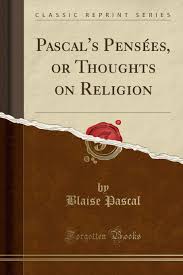Pensées Page #7
The Pensées is a collection of fragments on theology and philosophy written by 17th-century philosopher and mathematician Blaise Pascal. Pascal's religious conversion led him into a life of asceticism, and the Pensées was in many ways his life's work. The Pensées represented Pascal's defense of the Christian religion.
17 Rivers are roads which move,[8] and which carry us whither we desire to go. 18 When we do not know the truth of a thing, it is of advantage that there should exist a common error which determines the mind of man, as, for example, the moon, to which is attributed the change of seasons, the progress of diseases, etc. For the chief malady of man is restless curiosity about things which he cannot understand; and it is not so bad for him to be in error as to be curious to no purpose. The manner in which Epictetus, Montaigne, and Salomon de Tultie[9] wrote, is the most usual, the most suggestive, the most remembered, and the oftenest quoted; because it is entirely composed of thoughts born from the common talk of life. As when we speak of the common error which exists among men that the moon is the cause of everything, we never fail to say that Salomon de Tultie says that when we do not know the truth of a thing, it is of advantage that there should exist a common error, etc.; which is the thought above. 19 The last thing one settles in writing a book is what one should put in first. 20 Order.--Why should I undertake to divide my virtues into four rather than into six? Why should I rather establish virtue in four, in two, in one? Why into Abstine et sustine[10] rather than into "Follow Nature,"[11] or, "Conduct your private affairs without injustice," as Plato,[12] or anything else? But there, you will say, everything is contained in one word. Yes, but it is useless without explanation, and when we come to explain it, as soon as we unfold this maxim which contains all the rest, they emerge in that first confusion which you desired to avoid. So, when they are all included in one, they are hidden and useless, as in a chest, and never appear save in their natural confusion. Nature has established them all without including one in the other. 21 Nature has made all her truths independent of one another. Our art makes one dependent on the other. But this is not natural. Each keeps its own place. 22 Let no one say that I have said nothing new; the arrangement of the subject is new. When we play tennis, we both play with the same ball, but one of us places it better. I had as soon it said that I used words employed before. And in the same way if the same thoughts in a different arrangement do not form a different discourse, no more do the same words in their different arrangement form different thoughts! 23 Words differently arranged have a different meaning, and meanings differently arranged have different effects. 24 Language.--We should not turn the mind from one thing to another, except for relaxation, and that when it is necessary and the time suitable, and not otherwise. For he that relaxes out of season wearies, and he who wearies us out of season makes us languid, since we turn quite away. So much does our perverse lust like to do the contrary of what those wish to obtain from us without giving us pleasure, the coin for which we will do whatever is wanted. 25 Eloquence.--It requires the pleasant and the real; but the pleasant must itself be drawn from the true. 26 Eloquence is a painting of thought; and thus those who, after having painted it, add something more, make a picture instead of a portrait. 27 Miscellaneous. Language.--Those who make antitheses by forcing words are like those who make false windows for symmetry. Their rule is not to speak accurately, but to make apt figures of speech. 28 Symmetry is what we see at a glance; based on the fact that there is no reason for any difference, and based also on the face of man; whence it happens that symmetry is only wanted in breadth, not in height or depth. 29 When we see a natural style, we are astonished and delighted; for we expected to see an author, and we find a man. Whereas those who have good taste, and who seeing a book expect to find a man, are quite surprised to find an author. Plus poetice quam humane locutus es. Those honour Nature well, who teach that she can speak on everything, even on theology. 30 We only consult the ear because the heart is wanting. The rule is uprightness. Beauty of omission, of judgment. 31 All the false beauties which we blame in Cicero have their admirers, and in great number. 32 There is a certain standard of grace and beauty which consists in a certain relation between our nature, such as it is, weak or strong, and the thing which pleases us. Whatever is formed according to this standard pleases us, be it house, song, discourse, verse, prose, woman, birds, rivers, trees, rooms, dress, etc. Whatever is not made according to this standard displeases those who have good taste. And as there is a perfect relation between a song and a house which are made after a good model, because they are like this good model, though each after its kind; even so there is a perfect relation between things made after a bad model. Not that the bad model is unique, for there are many; but each bad sonnet, for example, on whatever false model it is formed, is just like a woman dressed after that model. Nothing makes us understand better the ridiculousness of a false sonnet than to consider nature and the standard, and then to imagine a woman or a house made according to that standard. 33 Poetical beauty.--As we speak of poetical beauty, so ought we to speak of mathematical beauty and medical beauty. But we do not do so; and the reason is that we know well what is the object of mathematics, and that it consists in proofs, and what is the object of medicine, and that it consists in healing. But we do not know in what grace consists, which is the object of poetry. We do not know the natural model which we ought to imitate; and through lack of this knowledge, we have coined fantastic terms, "The golden age," "The wonder of our times," "Fatal," etc., and call this jargon poetical beauty.[13] But whoever imagines a woman after this model, which consists in saying little things in big words, will see a pretty girl adorned with mirrors and chains, at whom he will smile; because we know better wherein consists the charm of woman than the charm of verse. But those who are ignorant would admire her in this dress, and there are many villages in which she would be taken for the queen; hence we call sonnets made after this model "Village Queens." 34 No one passes in the world as skilled in verse unless he has put up the sign of a poet, a mathematician, etc. But educated people do not want a sign, and draw little distinction between the trade of a poet and that of an embroiderer.
Translation
Translate and read this book in other languages:
Select another language:
- - Select -
- 简体中文 (Chinese - Simplified)
- 繁體中文 (Chinese - Traditional)
- Español (Spanish)
- Esperanto (Esperanto)
- 日本語 (Japanese)
- Português (Portuguese)
- Deutsch (German)
- العربية (Arabic)
- Français (French)
- Русский (Russian)
- ಕನ್ನಡ (Kannada)
- 한국어 (Korean)
- עברית (Hebrew)
- Gaeilge (Irish)
- Українська (Ukrainian)
- اردو (Urdu)
- Magyar (Hungarian)
- मानक हिन्दी (Hindi)
- Indonesia (Indonesian)
- Italiano (Italian)
- தமிழ் (Tamil)
- Türkçe (Turkish)
- తెలుగు (Telugu)
- ภาษาไทย (Thai)
- Tiếng Việt (Vietnamese)
- Čeština (Czech)
- Polski (Polish)
- Bahasa Indonesia (Indonesian)
- Românește (Romanian)
- Nederlands (Dutch)
- Ελληνικά (Greek)
- Latinum (Latin)
- Svenska (Swedish)
- Dansk (Danish)
- Suomi (Finnish)
- فارسی (Persian)
- ייִדיש (Yiddish)
- հայերեն (Armenian)
- Norsk (Norwegian)
- English (English)
Citation
Use the citation below to add this book to your bibliography:
Style:MLAChicagoAPA
"Pensées Books." Literature.com. STANDS4 LLC, 2024. Web. 25 Nov. 2024. <https://www.literature.com/book/pens%C3%A9es_114>.




Discuss this Pensées book with the community:
Report Comment
We're doing our best to make sure our content is useful, accurate and safe.
If by any chance you spot an inappropriate comment while navigating through our website please use this form to let us know, and we'll take care of it shortly.
Attachment
You need to be logged in to favorite.
Log In